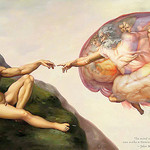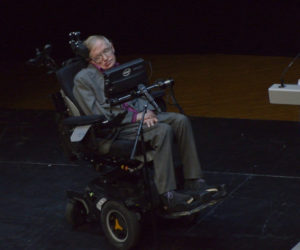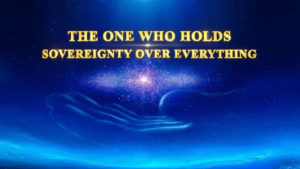Posted by Roberta Grimes • November 10, 2018 • 25 Comments
Afterlife Research, Jesus, The Source, Understanding Reality
![]() The worst barrier between humankind and our ability to understand reality is the fact that we cannot ask the greatest of all questions factually. If we ask that question as it is asked in the title of this post, and even if we assume the question refers to the Christian God and not to Vishnu or Amun, no one attempts to give a factual answer!
The worst barrier between humankind and our ability to understand reality is the fact that we cannot ask the greatest of all questions factually. If we ask that question as it is asked in the title of this post, and even if we assume the question refers to the Christian God and not to Vishnu or Amun, no one attempts to give a factual answer!
The Christian God’s existence is presented to us as something we must take on faith. Now, I am open to the idea of a God – I really hope a God exists! – but I am unable to content myself with taking anything on faith. So since I won’t take God’s existence on faith, I am an atheist. There is no God. And where science is concerned, this problem may be worse! Since I am a scientist who wants only facts, I refuse to believe in a Christian God that cannot be considered factually. Which means, of course, that there is no God and everything arose by chance. Now, true, we haven’t yet figured out how consciousness happens in the brain or how life could have begun or why the Big Bang happened, but our believing that none of it needs a God that must be taken on faith alone is a more than sufficient negative answer to make us certain that no God exists.
 Neither Christianity nor science is willing to consider the possibility of a factual God. So even if we want a God so badly that we force ourselves to “have faith in God,” every one of us by definition is a factual agnostic. But, good grief, whether there actually is a God has to be the most important facts-based question of all time! Even my believing with all my heart that I have cured cancer or won a major lottery cannot affect either my bank account or whether I will win a Nobel Prize; and even my absolute certainty that no Creator God exists is going to make it one whit more likely that I will be able to figure out how life arose on its own from some primordial goo.
Neither Christianity nor science is willing to consider the possibility of a factual God. So even if we want a God so badly that we force ourselves to “have faith in God,” every one of us by definition is a factual agnostic. But, good grief, whether there actually is a God has to be the most important facts-based question of all time! Even my believing with all my heart that I have cured cancer or won a major lottery cannot affect either my bank account or whether I will win a Nobel Prize; and even my absolute certainty that no Creator God exists is going to make it one whit more likely that I will be able to figure out how life arose on its own from some primordial goo.
I have written about this problem from various directions as a battle between science and Christianity, as religious nonsense vs. scientific folly. I have laid out arguments, poked fun, and torn my hair out in frustration! I have reported on the work of extraordinary researchers and devoted my life to presenting the evidence. But now I realize I am missing the mark. Since the ongoing battle between science and Christianity is a conversation about beliefs alone, even if one side somehow wins, their millennia-long struggle cannot settle anything!
 I suffered this disheartening epiphany as I read a recent article in The Washington Times called “Science’s Godless Problem.” Right up my alley! It begins, “Cosmologist Stephen Hawking made headlines from beyond the grave this October when, seven months after his death, his presumed last book was published bearing these words: ‘There is no God.’ And with that, the already wide gap separating science and religion, physical from spiritual, got a bit wider.”
I suffered this disheartening epiphany as I read a recent article in The Washington Times called “Science’s Godless Problem.” Right up my alley! It begins, “Cosmologist Stephen Hawking made headlines from beyond the grave this October when, seven months after his death, his presumed last book was published bearing these words: ‘There is no God.’ And with that, the already wide gap separating science and religion, physical from spiritual, got a bit wider.”
My first thought was, “Who cares?” Then I realized that is the entire point! If Dr. Hawking had said, “I now can demonstrate based upon extensive evidence that there is no base creative force,” and if he then had made a factual case, that would have been another matter; but it makes no difference to you or me what the person sitting next to us might believe. And Dr. Hawking agrees with me! It turns out that what he had said in his new book – in a section called “Brief Answers to Big Questions” – was this: “We are each free to believe what we want, and it’s my view that the simplest explanation is that there is no God. No one created the universe and no one directs our fate.” Thank you, sir! You have made my point.
This article concludes by saying, “A science world with a default premise of No God is a disservice, in the end, to true scientific inquiry.” Well, of course that is perfectly true! But what about a spiritual world that still holds up a “default premise” of an entirely beliefs-based Christian God that has changed not at all in two thousand years? How does that advance the understanding of the seven billion people on earth who need real spiritual advancement now a great deal more than they need another planet or a better cellphone?
Neither science nor Christianity is willing to see this problem, so certainly neither of them will address it. To be frank, their truce suits them both just fine! Each can bash the other for being beliefs-based and closed-minded, while at the same time the enforced ignorance that each of them espouses serves to protect the enforced ignorance of the other. Plato and Aristotle are said to have been the first to divide human inquiry between the spiritual and scientific realms. And so long as the intellectual descendants of those worthies still refuse to call out one another for maintaining this artificial division that frankly never made a lick of sense, their ancient gig can continue. The religion-biased author of that Washington Times article says, “Researchers with the Religion and Public Life Program at Rice University in Texas reported in December of 2015 the state of biologists’ and physicists’ spirituality in eight regions of the world and found: ‘Scientists are indeed more secular — in terms of beliefs and practices — than those in their respective general populations.’ Specifically, 35 percent of U.S. scientists told researchers they were atheists. That’s a third of the researching, teaching, publishing, fund- and grant-receiving scientific population of America — and it comes amid findings from Gallup in 2016 showing about 90 percent of Americans believe in God, and amid a survey from Pew Research in 2017 revealing a third of Americans read the Bible at least once a week. Call it a great divide.”
neither of them will address it. To be frank, their truce suits them both just fine! Each can bash the other for being beliefs-based and closed-minded, while at the same time the enforced ignorance that each of them espouses serves to protect the enforced ignorance of the other. Plato and Aristotle are said to have been the first to divide human inquiry between the spiritual and scientific realms. And so long as the intellectual descendants of those worthies still refuse to call out one another for maintaining this artificial division that frankly never made a lick of sense, their ancient gig can continue. The religion-biased author of that Washington Times article says, “Researchers with the Religion and Public Life Program at Rice University in Texas reported in December of 2015 the state of biologists’ and physicists’ spirituality in eight regions of the world and found: ‘Scientists are indeed more secular — in terms of beliefs and practices — than those in their respective general populations.’ Specifically, 35 percent of U.S. scientists told researchers they were atheists. That’s a third of the researching, teaching, publishing, fund- and grant-receiving scientific population of America — and it comes amid findings from Gallup in 2016 showing about 90 percent of Americans believe in God, and amid a survey from Pew Research in 2017 revealing a third of Americans read the Bible at least once a week. Call it a great divide.”
But it is not a divide. It’s a mutual support system! And the rest of us are left out in the cold.
 How might we begin an objective attempt to factually answer that greatest of all questions? All I can tell you is how I answered it. Once scientists are allowed to really go for it, I am sure they will do a much better job! But since my facts-based research has yielded a factually certain God more wonderful than any Christian’s fondest imaginings, I will give you here a brief summary of how I found the genuine God. I used three primary sets of data:
How might we begin an objective attempt to factually answer that greatest of all questions? All I can tell you is how I answered it. Once scientists are allowed to really go for it, I am sure they will do a much better job! But since my facts-based research has yielded a factually certain God more wonderful than any Christian’s fondest imaginings, I will give you here a brief summary of how I found the genuine God. I used three primary sets of data:
 But we have the recorded words of someone who walked the earth two thousand years ago claiming to know things that he could not have known if there were no factual God. And the testimony of Jesus agrees with the testimony of the dead in sometimes extraordinary detail!
But we have the recorded words of someone who walked the earth two thousand years ago claiming to know things that he could not have known if there were no factual God. And the testimony of Jesus agrees with the testimony of the dead in sometimes extraordinary detail!God is factually real! God is the only thing that is real, and your own mind is inextricably part of that all-powerful and perfectly loving God. And if someone so scientifically clueless as I am was able to find the factual God, then it is time for both Christianity and mainstream science to advance intellectually beyond Plato and Aristotle.
 History’s greatest scientists have cared more about facts than scientists do now. Both Albert Einstein and Max Planck found the same God that I did! Planck said, ”I regard consciousness as fundamental. I regard matter as derivative from consciousness. We cannot get behind consciousness. Everything that we talk about, everything that we regard as existing, postulates consciousness.” And Einstein said, “Concerning matter, we have been all wrong. What we have called matter is energy, whose vibration has been so lowered as to be perceptible to the senses. There is no matter.” Even poor Dr. Hawking said in a younger, more hopeful day, “What is it that breathes fire into the equations and makes a universe for them to describe?… Why does the universe go to all the bother of existing?” And the great scientist and polymath Nikola Tesla, said, “The day science begins to study non-physical phenomena, it will make more progress in one decade than in all the previous centuries of its existence.”
History’s greatest scientists have cared more about facts than scientists do now. Both Albert Einstein and Max Planck found the same God that I did! Planck said, ”I regard consciousness as fundamental. I regard matter as derivative from consciousness. We cannot get behind consciousness. Everything that we talk about, everything that we regard as existing, postulates consciousness.” And Einstein said, “Concerning matter, we have been all wrong. What we have called matter is energy, whose vibration has been so lowered as to be perceptible to the senses. There is no matter.” Even poor Dr. Hawking said in a younger, more hopeful day, “What is it that breathes fire into the equations and makes a universe for them to describe?… Why does the universe go to all the bother of existing?” And the great scientist and polymath Nikola Tesla, said, “The day science begins to study non-physical phenomena, it will make more progress in one decade than in all the previous centuries of its existence.”
It is past time for scientists and Christians to stop their game of keep-away that  continues to hide from us the factual answer to this greatest of all questions! God is real, but the genuine God is nothing like the Christian God so in finding the truth they each will lose something while at the same time they both will win. And you and I and all of humankind for ages to come will be the biggest winners!
continues to hide from us the factual answer to this greatest of all questions! God is real, but the genuine God is nothing like the Christian God so in finding the truth they each will lose something while at the same time they both will win. And you and I and all of humankind for ages to come will be the biggest winners!
Dear Roberta, Much enjoyed your wise post. I have started to read the Summa Summa of Thomas Aquinas, and your didactic approach matches his style. I was delighted to see you referencing Hawking posthumously published book, for good reason.
I had driven myself into studying the NDE literature when I decided to write a refutation of Stephen Hawking’s position that quantum mechanics was sufficient to explain Creation, without any resort to a God who does not exist. I intuited that Hawking rejected God, because he was susceptible to drawing an inference that any almighty creator would have to have disliked him, given his awful affliction. Was recently in Costco and browsed their books, and came across Hawking’s new book, “Brief Answers to the Big Questions, ” and Chap 1. Is there a God?
Bingo. Early in Chapter 1. he mentions that, if he accepted that there were God, then he would have to accept that he must have done something to irritate God to have been born with his awful disease. He goes on to assert that the Universe simply erupted into existence from nothingness by scientifically discernable natural law.
Too bad for his life that he did not get into the NDE literature where many tell that they learned that they came here having accepted specific afflictions to boost there education in life– a hard life lived well does more for spiritual development than an easy life, granting that I do not know anyone who has had any kind of “easy life.”
Thank you for your thoughts, Jack! Your use of NDE literature is becoming an ever more common way for people to learn these essential truths, and of course NDEs are genuine and extraordinary experiences. For a long time I wouldn’t discuss them on Seek Reality however, for the plain reason that those that we used to think were dead tell us consistently that death is a one-way trip: they insist that no one who has come back from “death” ever has been to the genuine afterlife. No, NDEs happen in the astral plane, which is many times the size of this entire universe, and which includes places that mimic what the afterlife looks like and feels like. We all visit the astral, and often! While our bodies sleep, we astral-travel and visit with our transitioned loved ones and our guides, we take courses, and we relax.
My problem with NDEs is that since they are highly individual and tailored to the needs of the experiencer, some of them are religion-tinged, especially the NDEs of children, In fact, however, insofar as we have been able to see there is no afterlife religious practice at all and whatever religion we might practice or not practice on earth we all will go to precisely the same place. Some experiencers have written books where they insist that they have seen the afterlife, and it includes a lot of religious nonsense and even God’s throne! The last thing I ever would want to do would be to support that level of nonsense.
But I am becoming a bit more open-minded. Raymond Moody – the author of 1975’s Life After Life, where he coined the term Near-Death Experiences – has recently said publicly that NDEs can tell us nothing about the actual afterlife, and that other than thinking reincarnation is probable he knows nothing about it himself. A breath of fresh air! And I recently had a leading experiencer as a Seek Reality guest who said essentially the same thing. NDEs are genuine, extraordinary, and life-transforming experiences in which people often receive guidance they could not get in any other way. My only worry is that since some contain religious symbols and religion-related ideas, they might make the false notion that there is a Christian heaven go mainstream, but I am becoming less worried about that. I am beginning to accept them as the gift from God that they are.
Roberta, While the NDE (really its Out of Body component that has my interest, not the trauma inducing the NDE) frequently reports about God and Christ, they also report that God and Christ do not countenance religious dogma, and consider it to have become warped. God is always experienced as LOVE, and loving, and does not judge what we have done in our harsh lives, leaving it for us to decide we can and ought to do better.
The reports about meeting Christ have him asking only one question, and that amount to reminding that the Golden Rule is all that He asks for life on Earth.
So, the NDEs tell us that all of the dogmas are invented by humankind for various motives, some of which have much more to do with control and power than with revealing that we have been created by a loving God.
Jack, all of that is wonderful! But still, it is not what happens in the genuine afterlife, and I guess I am enough of a purist to be bothered by that. For example, the dead tell us that God is Spirit and never appears in physical form, but “He” is not infrequently present in NDEs. Even – amazingly – appearing like a physical judge at his high desk! The depictions of Jesus also tend to be religion-tinged, which makes me grumpy when the genuine Jesus is so emphatically against religions.
But – as you say – the message given in most NDEs of adults tends to be not radically wrong. And I am coming to accept that NDEs as a whole seem to be helpful in loosening the hold of traditional religions on people’s minds.
Hi Roberta,
I have a lot of notions about this, what the writer Murial Spark called “the only problem,” and maybe I will revisit some here depending on which way the comments drift. But for now, lately I can’t help wondering why this “debate” always has to be between the Christian concept and the “scientific” concept. There are as you say 7 billion souls on the planet and only a fraction perceive the divine the way the Christian dogma presents it.
Thank you, Mike! As you know, the only reason why anyone or any human institution will continue a practice despite opposition is that they find some value in it for them that is commensurate with the trouble that practice brings. And for Christian and scientific leaders, this false notion that they are at war over God vs. no-God brings to them both tremendous value! What is at stake for each is the literal survival of what have been very good gigs indeed.They are allies in the their mutual self-preservation! Neither of them can risk the possibility that anyone will ever openly investigate for broad public consumption the question of a factual God, since no matter how it turns out, the risk is tremendous that it will damage the public’s trust in both of them.
Christians are preventing the destruction of their dogmas about God which frankly are, to any open-minded adult, pretty much nonsense. A perfectly loving God who can’t forgive us for being human unless that God gets to watch the bloody murder of God’s own Son? Come on! Even before I was called out of Christianity by God – as more and more people are begin called now – I still could see that the Christian idea of God was nonsense! But if a genuine God that is different from the Christian God ever is found, then Christianity as they have been practicing it and profiting from it will be dust.
Scientists are protecting at least a century of “scientific advancement,” much of which will be trash if anyone can prove that there is what we used to call when I was a theology student “an Uncaused Cause.” Their whole lives’ work is at stake! As is the credibility of an institution that has invested much too heavily in a belief – atheism – that every bit of their work being done now is more and more proving to be probable garbage.
So it is easy to see why they are playing this game! If only one institution had an opinion about God that was central to its own survival, then that one could not for much longer withstand the barrage of truth being thrown it it. But now they cleverly have two major blocks – the adherents of Christianity and the adherents of science – supporting what is an entirely cynical partnership’s fight for its mutual survival.
So it is going to take longer for the truth to prevail! But, make no mistake. the truth is going to prevail, and soon. And the harder Christianity and mainstream science continue to fight that truth, the more complete will be their fall.
I am not a Buddhist, and I don’t understand Buddism well and don’t pretend to. But the Dalai Lama has regular meetings with scientists and academics in which — while the latter are still very much materialists and temporally focused– the conversation isn’t so much of the kind of “cold war” dialogue you describe going on between Christian theologians and western scientists. This is in part because non-western concepts seem to have an easier time with the idea that we can only represent God with certain concepts, not discern and identify God. So if one representation is no longer valid, the Dalai Lama doesn’t dig in. Also since Buddism is focused more on cause/effect, the Dalai Lama has some vocabulary in common with science already. But, it does seem, Buddism can “deal” with a causeless cause concept, or a cause that is its own effect, so there is a philosophy open to eternal Consciousness, whereas the materialist scientists are stymied. I am not advocating Buddism. I am just saying that if there is a breakthrough to reveal the FACT of God, my money (if I had any) would be on it coming from a more eastern- than western-thought based point of view.
I studied Buddhism and some other Eastern religions in college a million years ago, and in fact they are more philosophies than they are religions. They are lighter on the dogmas and, as you suggest, more flexible.
With scientists and Christians, there actually is no “cold war” dialogue. In fact, there is no dialogue at all! Nor can there be. Nor is any reason for a dialogue ever envisioned. Eastern religions don’t have a history anything like the Plato/Aristotle division between spiritual and physical studies, which to me seems to be the primary reason why dialogue can happen in the East so easily and naturally.
Those who work in the field of afterlife studies have by and large become convinced that only when there is a reliable method of individual communication with the afterlife – an app or something – will scientists be shamed into studying it, and those that we used to think were dead seem to share that view. They are working now pretty intensively on trying to put good electronic communication into place.
Thunderbolts Project is a great resource. It’s all about the energies………
https://us7.campaign-archive.com/?u=1b8e5fc5ffab70f95805dea12&id=bac26ef274&e=9c90db5843
Thank you for this suggestion, Mary! It might resonate with some readers. I know about David Talbott and his work, and I find him to be a solid scholar; but I don’t actively promote what he does at this point. I feel driven instead to speak not to more open-minded people and New Agers, but instead to frustrated Christians who love Jesus but increasingly cannot stand the religion and are eager for the knowledge that I can give to them. Each teacher has been given a particular class of students to assist and to love! And in the case of helping Christians to find the genuine Jesus, as the Lord said, “The harvest is plentiful, but the workers are few” (MT 9:37).
I think most of the problem here stems around how we define God. For centuries, God has been thought of as having human qualities, especially by the Christian religion, who tended to think of God as a separate entity who demanded worship and strict adherence to specific standards etc. Obviously, this creates fear and frustration and implies that God has a giant ego, which would be impossible for any “divine being” to have. Our ability to understand the concept of God is extremely limited if we insist on thinking this way. Some have addressed the problem by insisting that the universe and everything in it was created by higher level cosmic beings whose level of technology is beyond our understanding. Although I would never rule that out, it begs the question of who created these higher level beings. In any event, Nikola Tesla was correct when he said that studying non-physical phenomena would have given us much more information than studying material based scientific theories.
Lola, I think it is really the Judaeo-Christian tradition and its iterations of the anthropomorphic Jehovah-God that is cranky and too human-like which gives us this awful image of God. That deity came over into Christianity, beard and all! And we are stuck with dealing with and diffusing the fear-generating powers of that fake God if we are to rescue modern Christians from it. Jesus is the answer to that problem, as He is to so many problems!
Just curious: from where and when did that concept of God come into Christianity? Milton didn’t use it. Schopenhouer didn’t. They both envisioned representations rather than literal personages. The character strikes me as very Greek.
Mike, the anthropomorphic and highly judgmental God with a beard and thunderbolts is the ancient Jewish Jehovah, what is probably the first sole God held in belief by any significant number of people. Ancient Christianity as it was first formulated in the earliest Councils – primarily in the Council of Nicaea in 325 – simply assumed that version of God and tried to transform it into something more positive by making the crucifixion of Jesus and God’s acceptance of His death to redeem us from God’s perfectly justified wrath seem to be a good thing! Yes, much later there were Christian thinkers who wisely de-emphasized that physical version of God, but the religion itself – and especially Catholicism – still sees God as having a physical aspect. The Christian Trinity of Father, Son, and Holy Spirit wouldn’t need that third aspect if the religion saw God as entirely non-physical!
Milton had a very interesting representation of the Trinity. The “Father” a bright light masked by a cloud–present, but not “perceivable”; the “Son” (not embodied as yet by Jesus) — the creative force in the universe (only later incarnated once Paradise was “lost”); and the Holy Spirit as the liaison between the creative force and the “world.” Truly a representation and not a characterization, and certainly not the Catholic dogma. I am not defending Milton. I am just putting a few years of graduate school to use.
I agree. I don’t think that Jesus’ goal was to establish a church with strict religious doctrines. His teachings were about unity, harmony and tolerance, but things got waaaay out of hand thanks to human ego..
Yes! And more so than I had ever imagined. I am now working on The Fun of Loving Jesus – Embracing the Christianity that Jesus Taught, so I am delving more into trying to understand precisely what the movement is that He actually meant to start. Amazingly, the truth is all there, in plain words! One of the reasons I love writing these books is that I learn so much more in the process!
Hi Roberta, Jesus does indeed give us solutions for resolving this dichotomy. This is one of my favorite “Jesus answers”. Paraphrasing John 4: 21-28, we have a Samaritan woman asking Jesus where should she worship? Should she worship with her religion on the mountain, or what she perceived to be Jesus’ religion, at the temple in Jerusalem. Jesus gives us this amazing answer. “23 Yet a time is coming and has now come when the true worshipers will worship the Father in the Spirit and in truth, for they are the kind of worshipers the Father seeks. 24 God is spirit, and his worshipers must worship in the Spirit and in truth.”
In one brilliant stroke Jesus gives us an answer that religious dogma and belief (including belief and faith in science) can never give. To “worship” in the spirit we must realize our own nature as spiritual beings and who and what we truly are.
Roberta and friends God is not an idea or belief system and cannot be approached by thinking. God is found within our own non physical spiritual being. “God” is the never ending source of ALL that is, has been, and ever shall be. In my experience God cannot be known about, but only experienced. Amazingly another gem of truth is found in the Bible Acts 18:28 28 “For in him (God) we live, and move, and have our being; as your own poets have said, for we are also his offspring.” We are all looking and trying so hard to find who we already are and gain which is already here. What is required of is “real”ization, not dogmatic pursuit, faith, or belief. Offering one final slightly altered verse, Psalm 46:10 Be still and know (realize)… I Am… God.
As Roberta knows, I am a retired Methodist pastor, and no longer find my place in church.
Oh my dear Michael, this is so brilliant! I can add nothing to it. Thank you so much!!
Michael
thank you for your lovely words which resonated deep within and gave me a lovely warm feeling in my “soul”. I am no academic, however I too was called out of “church” by God something that for me was really scary , no-one liked my questions…
yet what I am discovering on my journey is something far bigger than I could ever imagine.
Than you Roberta for your open ness and honesty which I find so thoroughly enjoyable in your blog but most of all the word of Jesus which I find so applicable to me now rather than boxed in a religious environment.
As I said no academic but just felt the need to speak .
Thankyou
Dear Louise, you have spoken so beautifully! I am surprised to report that I am hearing daily now from people saying essentially what you have said here: they felt called out of old-style Christianity and they want to follow the genuine Jesus but they don’t know how to do that; and meanwhile the fears engendered by that old-time religion are tormenting them. So many people now feel as you do that we are looking at how to provide them with the genuine spiritual home that Jesus came to bring to them. My book, The Fun of Loving Jesus, might perhaps be a new beginning for the Lord!
Hi Roberta,
I love reading your blog, gives me a lot to ponder. Besides Jesus, is there any scholar or person who has any insight to this question, “does God exist?”
This is a good question, and a surprisingly difficult one to answer. Even after my two experiences of light and my always thereafter knowing that God is real, I didn’t have my own OMG! moment (literally) until I had put together nearly 200 years of abundant and consistent afterlife evidence and had compared what the dead have been telling us with the Gospel words of Jesus in a modern English translation. AND THEY MATCHED!! Even in small and peculiar details, they matched. And that would not have been possible if Jesus had not come to us directly from God. My primary spirit guide has since told me more details about Jesus, and about God, but it was that one extraordinary discovery that made God as real to me as anything ever has been real to me.
The problem with our looking elsewhere for validation of the Godhead is that religions claim to know God but religions are all flies in amber, stuck in some ancient past and with the limited understanding of ancient peoples. To be frank, I don’t now know of any authority that can be reliably consulted on whether there is a God and what that God is like other than those that we used to think were dead! And they tell us that God is real but is nothing like the Christian God, and Jesus is emphatically the real deal but Christianity in its 40,000-odd forms is not.
I’m not sure where else we can reliably look!
I think the message from the afterlife is that we are god ans god is everything. We are parts of god, trying to reunite as one consciousness. I think we are god experiencing itself individually.
Our minds are indeed all part of the Godhead, which is – as Jesus told us – Spirit. But apparently we are not trying to reunite, since we have never really been separate: the sense we have of being separate is merely an illusion. God is indeed all that exists, and we do come to earth (and to other planets as well) to have experiences that we could not have while we are in the greater reality where we actually live our eternal lives. As to WHY this all happens, I have never yet seen what I thought was a satisfactory answer! But we have access to only a limited part of our eternal minds while we are in bodies, and we are told by upper-level beings that we cannot possibly really understand what is going on while we are here; but when we graduate, it all will make sense to us.
Thank you for your thoughts, Freya!